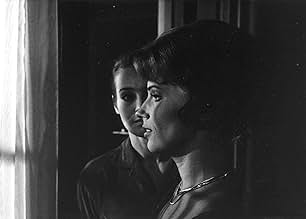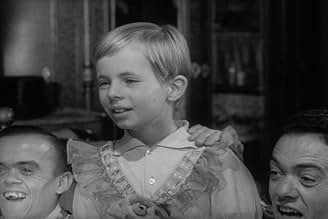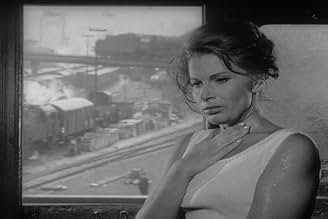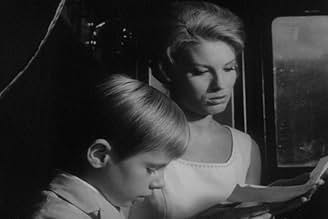Two estranged sisters, Ester and Anna, and Anna's 10-year-old son travel to the Central European country on the verge of war. Ester becomes seriously ill and the three of them move into a ho... Read allTwo estranged sisters, Ester and Anna, and Anna's 10-year-old son travel to the Central European country on the verge of war. Ester becomes seriously ill and the three of them move into a hotel in a small town called Timoka.Two estranged sisters, Ester and Anna, and Anna's 10-year-old son travel to the Central European country on the verge of war. Ester becomes seriously ill and the three of them move into a hotel in a small town called Timoka.
- Awards
- 3 wins & 2 nominations total
- Woman in Variety Hall
- (uncredited)
- The Paperboy
- (uncredited)
- Man in Variety Hall
- (uncredited)
- Impressario
- (uncredited)
- The Bar Owner
- (uncredited)
- The Doorkeeper
- (uncredited)
- Anna
- (uncredited)
- The Cashier
- (uncredited)
- The Old Man
- (uncredited)
- Director
- Writer
- All cast & crew
- Production, box office & more at IMDbPro
Featured reviews
It's a study in contrasts. It's about the strife sewn into the lining of family intimacy, contrasted with the perfection of strangers engaged in the base behaviors. Complexity vs. Simplicity. The common ground shared by youthful innocence and ignorance vs. the confusion imposed by years of living. Short people seeking acceptance vs. normal folk who are so completely unacceptable to each other. It's about a dying woman whose life's work is translating one language to another so others can understand it vs. two people who speak the same language who cannot understand each other (further) vs. two other people who speak different languages who have a better understanding than those sharing a common lexicon. And on and on.
Watching this film, it occurred to me how deeply Bergman's work influenced the likes of Kubrick and Hitchcock and Aldrich and Leigh so many more. 2001 Space Odyssey, Psycho, so many of the great films have seeds here. The screen was Bergman's canvas; the camera his brush. Neither the script nor the imagery alone created the work. His work has a soul from the combination of all of it.
Watch Bergman's life's work and save yourself a bundle on film school. You'll be in the master's care.
Often referred to as the third in a trilogy, it is more profoundly the third in a sequence of three world class pieces of cinema, as the emotions and frustrations of Ester (Ingrid Thulin) carry the viewer over a threshold of uncertainty, inconclusiveness, bewilderment and confusion - with Gunnel Lindblom as Anna playing her part to perfection too - but don't ask me why, because the gaps reach to the sky.
The film also has one or two monumental pieces of cinematography - not least the scenes with the small boy in the large lobby of the hotel - far more effective in this film than in the "tribute use" by Kubrick in the Shining many years later. The shots of tanks rolling through the unnamed Southern European town will stick in my mind for a long time.
Ingrid Thulin and Gunnel Lindblom were two of Bergman's best women and he works with them to terrific effect in this movie.
This is one of the great movies - highly recommended.
Bergman's women shine in this film, too, although they must have been exhausted afterwards. Ingrid Thulin and Gunnel Lindblom star as the two sisters, whose apparent incestuous relationship has destroyed them both, Esther (Thulin) physically (she is dying) and Anna (Lindblom) mentally. They arrive, with Anna's son Johan, in a foreign city at war, which creates an uncozy atmosphere around Sven Nykvist's exterior shots. The tanks roll down the city streets, becoming a metaphor of the war of emotions between Anna and Esther. Thulin makes a very physically demanding performance, like Harriet Andersson in "Cries and Whispers" she is dying (of cancer?), and her pain is showing. Anna clearly wants to hurt her sister, who is the oldest and smartest of them, by saying cruel things and playing with Esther's apparent sexual love for her.
Sigmund Freud would have loved this film, and Anna seems to want to break free from her sister by having casual sex with a man she meets at a bar. She then tells her sister about it, and Esther's reactions to this is extremely ambiguous, like most of the film is. Anna's wish to become free of her sister is deeply rooted in childhood experiences, and it leads Anna to say things like "I wish she was dead" to the man who does not understand a word she is saying. All these things make "Tystnaden" the disturbing film it is. The only release is when Johan explores the corridors of the hotel alone, meeting a bunch of short men who perform at a circus-like variete Anna visits to escape from the sight of Esther. But Johan meets a kind (or is he a paedophiliac?) old man who works at the hotel, and it is he who has to care for Esther as she draws her last breaths, Anna tearing Johan away from her sister's arm in a very cruel manner. The long periods of silence in the film perhaps makes the title, or perhaps it means that the silence about the sisters' past is never broken to us, the spectators. A lot is left up to us to interpret, typically of Bergman's cinema.
All in all, a very ambivalent, Freudian and disturbing film from one of the masters of the cinema.
Did you know
- TriviaThe language in the movie is Gun Grut Bergman's creation. She was a translator and linguist in Slavic languages. The name of the city, which is indicated first in the train's speaker, and then by Anna, as Timoka, is a real word however. Bergman found it in a book in Estonian on the bookshelf of his wife Käbi Laretei. When he asked what it meant, she replied "belonging to the hangman".
- Quotes
Ester: I didn't want to accept my wretched role. But now it's too damn lonely. We try out attitudes and find them all worthless. The forces are all too strong. I mean the forces... the horrible forces. You need to watch your step among all the ghosts and memories.
Ester: All this talk... There's no need to discuss loneliness. It's a waste of time.
- Alternate versionsThe original UK cinema release featured the pre-edited US print which was then cut by a further 35 secs by the BBFC to shorten some shots of Ester stroking Anna's hair and to replace subtitled references to erections and semen. The 1999 Tartan video is the complete version.
- ConnectionsEdited into Journal d un père (2023)
- SoundtracksGoldberg Variations, BWV 988 - Variatio 25
Music by Johann Sebastian Bach
- How long is The Silence?Powered by Alexa
Details
Box office
- Gross worldwide
- $14,199
- Runtime
- 1h 36m(96 min)
- Color
- Aspect ratio
- 1.37 : 1




























